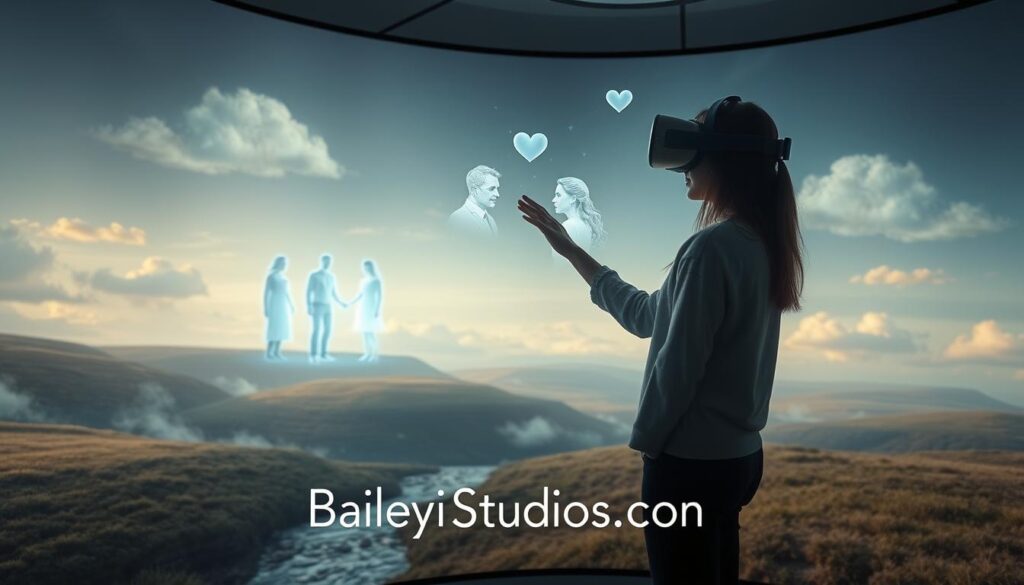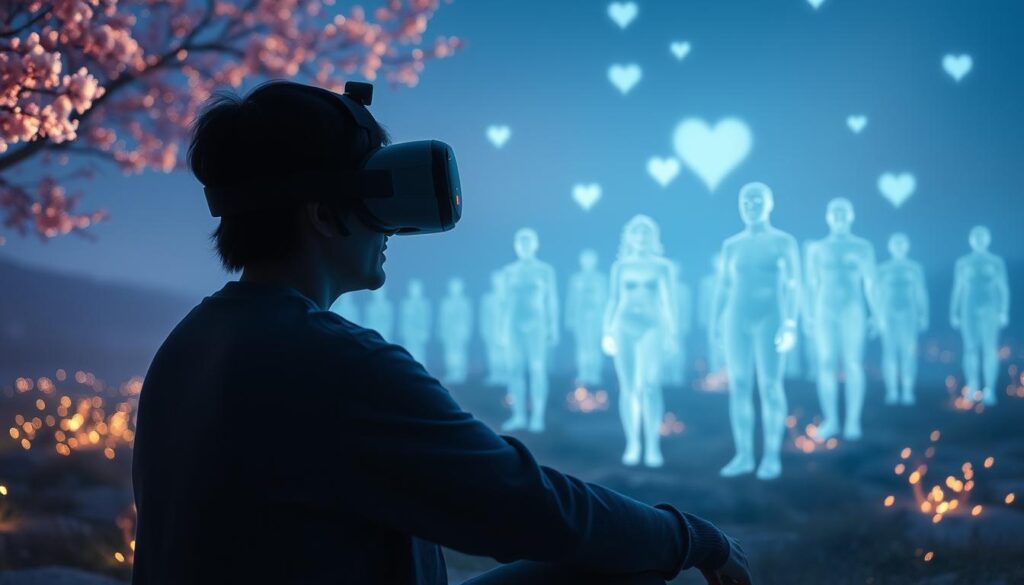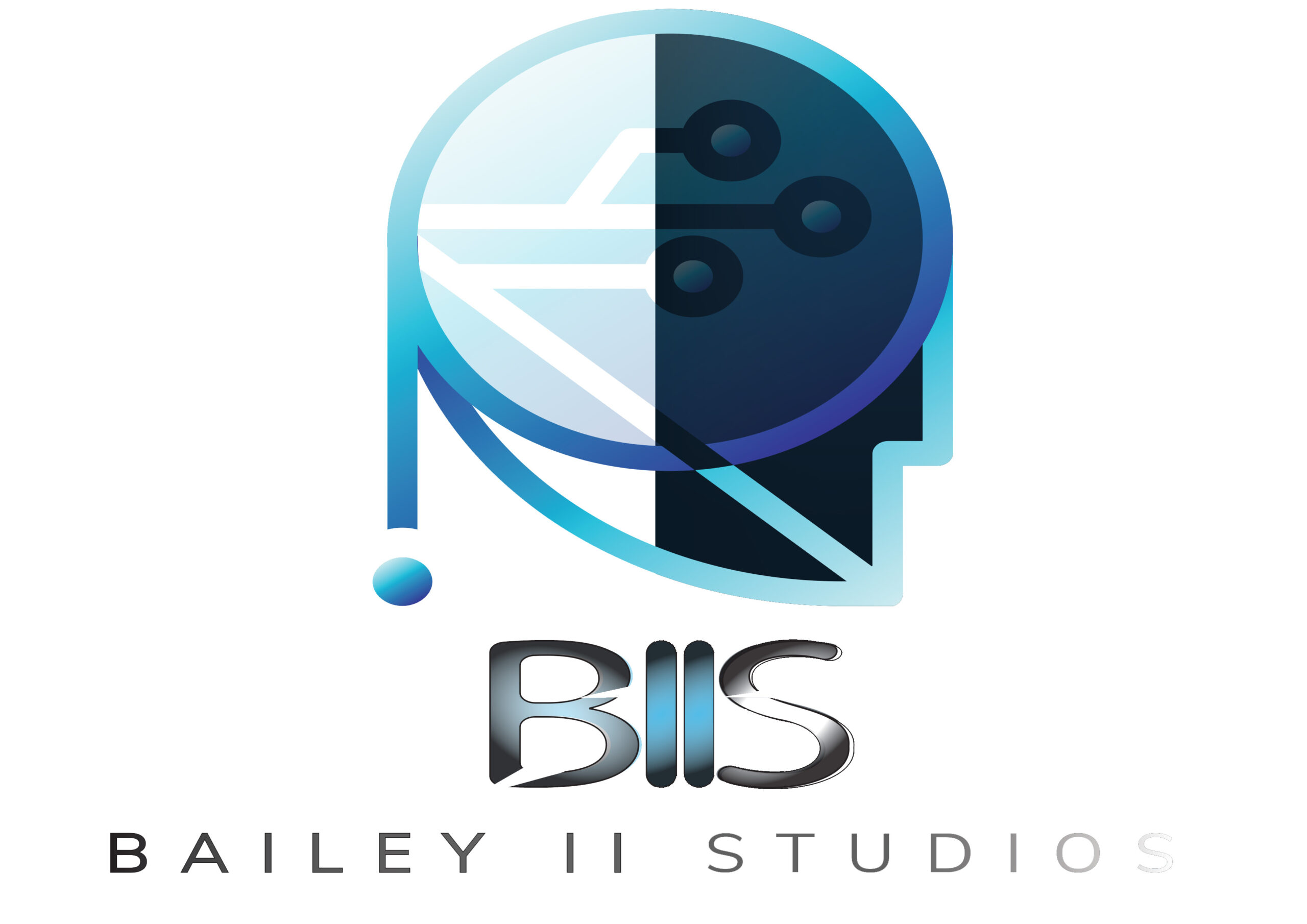In today's digital world, technology is changing how we experience life. Now, we can connect with our loved ones who have passed away through virtual reality (VR). This new technology lets us cherish memories and keep our connection alive in a unique way.
Imagine stepping into a virtual world where you can see and hear your loved ones again. This is made possible by advanced VR technology. It's changing how we grieve and what it means to connect with others.
VR grief counseling is growing fast. Mental health experts are finding new ways to use it. They're making grief healing better and offering hope to those who need it.
Virtual reality memorials offer a deep and lasting tribute. They celebrate your loved one's life in a way that feels real and personal.
 Virtual reality (VR) is becoming more common in grief counseling and memorial services. It's important to think about the ethical issues and risks it brings. These challenges need careful study.
Privacy and consent are big concerns. VR offers a deep, personal experience. This raises questions about privacy and the need for clear consent. Counselors and developers must make sure people know how their info will be used. They must get consent before starting VR grief counseling or memorial services.
There's also a risk of misuse or bad outcomes. VR can be very powerful, but it must be used carefully. Counselors and developers need to watch out. They should make sure VR doesn't hurt people who are already grieving.
Virtual reality (VR) is becoming more common in grief counseling and memorial services. It's important to think about the ethical issues and risks it brings. These challenges need careful study.
Privacy and consent are big concerns. VR offers a deep, personal experience. This raises questions about privacy and the need for clear consent. Counselors and developers must make sure people know how their info will be used. They must get consent before starting VR grief counseling or memorial services.
There's also a risk of misuse or bad outcomes. VR can be very powerful, but it must be used carefully. Counselors and developers need to watch out. They should make sure VR doesn't hurt people who are already grieving.
It's also important to think about fairness and who can use VR. VR can be pricey and not everyone can access it. Counselors and developers must make sure it's available to many people. This includes those from different backgrounds and with different skills.
As VR in grief support grows, we must be careful and thoughtful. We need to focus on the well-being and privacy of those using it. By doing this, we can use VR to help people deal with grief and loss.
 Virtual reality (VR) is changing grief counseling and memorialization. Personal stories show its impact. They give a deep look into the emotional journey and the power of this technology.
Sarah lost her husband in a tragic accident. "Trying the VR reunion with my late husband was overwhelming," she said. "It felt like we were in our living room again. The realism was amazing, giving me closure and comfort."
Virtual reality (VR) is changing grief counseling and memorialization. Personal stories show its impact. They give a deep look into the emotional journey and the power of this technology.
Sarah lost her husband in a tragic accident. "Trying the VR reunion with my late husband was overwhelming," she said. "It felt like we were in our living room again. The realism was amazing, giving me closure and comfort."
Key Takeaways
- Virtual reality technology offers a new way to reconnect with deceased loved ones
- This innovative approach is transforming the grief and bereavement process
- VR experiences can provide a sense of closure and continued connection
- The virtual world allows for personalized memorials and remembrance experiences
- Ethical considerations and potential risks must be carefully addressed
Exploring the Immersive World of Virtual Reality
Step into a world where reality and fantasy mix. Virtual reality (VR) has changed how we see digital spaces. It's now changing grief counseling and remembrance too.The Power of Cutting-Edge Technology
VR tech has grown to make digital worlds feel real. With special headsets and controllers, users dive into these worlds. They can touch virtual objects and even talk to avatars of loved ones who have passed away. This realism and interaction can heal those who are grieving. It offers a deep and meaningful experience.Redefining Boundaries: Virtual Reality's Potential
As VR tech gets better, its uses in virtual reality deceased simulation, virtual reality grief therapy, and virtual reality remembrance experience grow. Imagine reliving happy moments with a loved one or having a deep talk with their virtual form. These moments can bring closure and comfort. They open up new ways to grieve."Virtual reality has the power to transcend physical boundaries and connect us with our loved ones in ways previously unimaginable."VR also lets us create virtual memorials and remembrance experiences. It's a personal and interactive way to honor loved ones. This tech could change how we grieve, offering a new way to heal and remember.
Virtual Reality to See Dead Loved Ones An Emotional Journey
Dealing with the loss of a loved one is tough and deep. But, virtual reality (VR) offers a new way to connect with those who are gone. It's a powerful tool for grief counseling, leading to a journey of healing and comfort. With VR, people can step into a digital world where they can meet their loved ones again. It's a way to have deep talks, share memories, and relive special moments. This can be very healing and comforting."The ability to see and interact with my husband again, even if it's in a virtual space, has been an invaluable part of my healing process. It's as if he's here with me, and that connection has been truly healing."Using VR for reunions can be very helpful, but it must be done with care. It can deeply affect people, mixing technology with the loss of a loved one. It's a complex and emotional experience.
- Provides a sense of closure and connection for the bereaved
- Allows for the continuation of important conversations and the sharing of memories
- Offers a safe and controlled environment to explore and process grief
- Potential challenges include the risk of emotional distress or attachment issues
The Grief Healing Process
Dealing with grief is a personal and complex journey. Virtual reality (VR) technology is becoming a powerful tool to help people through grief. It allows mental health professionals to offer a more immersive and personalized approach to healing.Understanding the Stages of Grief
Grief is not a straightforward process. It has different stages that people may go through. These stages were first described by psychologist Elisabeth Kübler-Ross.- Denial: Refusing to accept the reality of the loss
- Anger: Feeling frustrated, resentful, or even envious of those who have not experienced a similar loss
- Bargaining: Attempting to negotiate or find ways to avoid the pain of the loss
- Depression: Experiencing feelings of sadness, loneliness, and hopelessness
- Acceptance: Gradually coming to terms with the reality of the loss and finding ways to move forward
"Virtual reality can create a safe and controlled environment for individuals to confront and process their grief, allowing them to move through the stages in a more structured and supported manner."Adding virtual reality bereavement to traditional grief counseling can be life-changing. It lets people explore and deal with their emotions in a meaningful and therapeutic way.
Virtual Reality Grief Counseling
Virtual reality (VR) is changing grief counseling. It helps people deal with losing a loved one. This new tech makes therapy more personal and real. VR grief counseling is a new way to handle grief. It lets therapists use VR to recreate memories. This helps clients grieve in a more real way. One big plus of VR grief counseling is it helps find closure. People can go back to special places and talk to their loved ones again. This makes the grieving process deeper and more healing.| Benefit of VR Grief Counseling | Description |
|---|---|
| Personalized Experiences | VR lets therapists make virtual places that are special to the client and their lost loved one. |
| Emotional Catharsis | VR's immersive nature helps people release their emotions deeply. This makes it easier to face and deal with grief. |
| Improved Accessibility | VR counseling can be done from anywhere. This is great for those who can't travel or live far from help. |
Creating Virtual Memorials and Remembrance Experiences
Virtual reality is changing how we remember our loved ones. Now, you can make virtual memorials and experiences that keep special moments alive. These are deeply personal and interactive.Preserving Cherished Moments
Virtual reality lets you bring back important places and moments. You can make virtual gardens or timelines that celebrate your loved one's life. It's like reliving special times, like family gatherings or hobbies, in a very real way. With virtual reality, you can make a memorial that feels truly personal. It's a way to honor your loved one and find comfort during tough times. These experiences offer a unique way to remember and heal.| Feature | Virtual Reality Memorial | Traditional Memorial |
|---|---|---|
| Immersion | Fully immersive, allowing you to interact with the environment | Limited to physical space and static displays |
| Personalization | Highly customizable to reflect the individual's life and interests | Typically more standardized in design |
| Accessibility | Accessible from anywhere, enabling remote participation | Requires physical presence at the memorial site |
| Interactivity | Allows for interactive experiences, such as sharing memories or engaging with digital artifacts | Limited to passive viewing and remembrance |
Ethical Considerations and Potential Risks
 Virtual reality (VR) is becoming more common in grief counseling and memorial services. It's important to think about the ethical issues and risks it brings. These challenges need careful study.
Privacy and consent are big concerns. VR offers a deep, personal experience. This raises questions about privacy and the need for clear consent. Counselors and developers must make sure people know how their info will be used. They must get consent before starting VR grief counseling or memorial services.
There's also a risk of misuse or bad outcomes. VR can be very powerful, but it must be used carefully. Counselors and developers need to watch out. They should make sure VR doesn't hurt people who are already grieving.
Virtual reality (VR) is becoming more common in grief counseling and memorial services. It's important to think about the ethical issues and risks it brings. These challenges need careful study.
Privacy and consent are big concerns. VR offers a deep, personal experience. This raises questions about privacy and the need for clear consent. Counselors and developers must make sure people know how their info will be used. They must get consent before starting VR grief counseling or memorial services.
There's also a risk of misuse or bad outcomes. VR can be very powerful, but it must be used carefully. Counselors and developers need to watch out. They should make sure VR doesn't hurt people who are already grieving.
| Ethical Considerations | Potential Risks |
|---|---|
| Privacy and consent | Misuse or unintended consequences |
| Equitable access and inclusivity | Lack of human connection and emotional support |
| Potential for re-traumatization | Technological limitations and glitches |
"The ethical use of virtual reality in grief counseling and bereavement support is paramount, as we strive to balance the benefits of this innovative technology with the need to protect the vulnerable and ensure that individuals receive the care and support they deserve."
The Future of Virtual Reality Bereavement Support
Technology is advancing fast, and virtual reality (VR) is changing how we deal with grief. It's becoming a powerful tool to honor our loved ones who have passed away. Experts say VR will bring new innovations and trends to bereavement support.Enhancing Connectivity and Closure
VR will help people connect with their loved ones in new ways. Soon, we might be able to create virtual spaces where we can talk to our loved ones again. This could bring a sense of closure and comfort. Adding haptic feedback and other sensory features will make these experiences feel more real. This could be a powerful way to help those grieving find comfort and healing.Personalized Grief Journeys
VR will also focus on making grief experiences more personal. Users can create their own virtual worlds and avatars. This will help them heal in a way that feels true to them. VR could also make grief therapy more effective. Counselors can offer sessions that are tailored to each person's needs. This could help individuals face their grief in a more meaningful way. As we face the challenges of loss and grief, VR is becoming a key part of bereavement support. It offers a compassionate and empowering way to navigate grief. By embracing these new trends, we can help people find solace and healing in virtual realms.Personal Stories and Testimonials
 Virtual reality (VR) is changing grief counseling and memorialization. Personal stories show its impact. They give a deep look into the emotional journey and the power of this technology.
Sarah lost her husband in a tragic accident. "Trying the VR reunion with my late husband was overwhelming," she said. "It felt like we were in our living room again. The realism was amazing, giving me closure and comfort."
Virtual reality (VR) is changing grief counseling and memorialization. Personal stories show its impact. They give a deep look into the emotional journey and the power of this technology.
Sarah lost her husband in a tragic accident. "Trying the VR reunion with my late husband was overwhelming," she said. "It felt like we were in our living room again. The realism was amazing, giving me closure and comfort."
"The virtual reality experience allowed me to say the things I never got to say, to see his face and hear his voice one more time. It was a truly healing moment that I will cherish forever."John, a grief counselor, has seen VR's impact. "Many clients feel relief and connection after VR," he says. "It's a powerful tool for processing grief, helping them cope and heal." These stories highlight VR's power in grief and loss. As it evolves, it offers comfort, closure, and connection to those who have lost loved ones.
Conclusion
Virtual reality is changing how we deal with grief and remember loved ones. It offers a new way to heal and honor those we've lost. This technology could bring comfort and change how we remember the past. With virtual reality, you can have unique and touching experiences. You can visit virtual memorials or even see loved ones again. These experiences can help us cope with grief in a powerful way. But, we must be careful with virtual reality in grief. There are risks and ethical issues to consider. We need to be kind and thoughtful as we explore this new area. This way, we can make the most of virtual reality and help people through tough times.FAQ
What is virtual reality and how can it be used to see dead loved ones?
Virtual reality (VR) is a computer-generated world that feels real. It lets you interact with digital scenes as if they were alive. VR can help you connect with loved ones who have passed away by creating realistic experiences.
How can virtual reality help with grief counseling and the bereavement process?
VR grief counseling offers a safe space to deal with emotions. It helps you move through grief and find ways to remember your loved one. VR can make therapy more effective and open new ways to heal and grow.
What are the benefits of creating virtual memorials and remembrance experiences?
Virtual memorials keep special moments alive. They let you create personalized tributes to your loved ones. These experiences help you feel closer to their memory and support your grief journey.
What are some of the ethical considerations and potential risks associated with using virtual reality for grief counseling and bereavement support?
VR has great potential in grief support, but there are risks. These include privacy concerns, misuse, and the need for professional guidance. It's important to be aware of these issues.
What does the future hold for virtual reality in the context of bereavement support and reconnecting with deceased loved ones?
The future of VR in bereavement looks bright. New technologies like holographic projections and AI simulations will likely offer even more ways to honor the memory of those we've lost. This could lead to more immersive and meaningful experiences.

